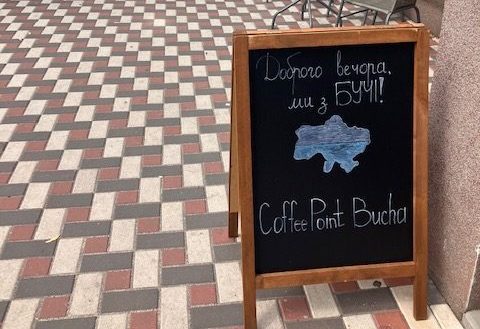Bucha genocide
A minibus stops ten minutes away from Bucha, Ukraine, by City Market in Hostomel, or, rather, whatever is left of a once spacious, modern supermarket after the Russian invasion. A billboard of a fancy pet store flaps in the wind next to a Grill and BBQ joint. The bus stop smells burned rubber and wood—not grill—the smell of the bombed sites. Broken glass crunches underneath my feet, as the road leads visitors towards Bucha mass graves.
Russian troops occupied Bucha, Irpin, Hostomel, and other small towns in the western suburb of Kyiv, on 3rd March 2022, during the first week of a full-scale Russian invasion. What happened next is described as the Bucha massacre and many countries have recognized the Russian troops’ crimes as genocide. A part of the Kyiv offensive, the Battle of Bucha lasted from 27th February to 31st March 2022. The Russians, failing to encircle and capture Kyiv, withdrew forces.
Whoever could, fled the Russians. They went back to Irpin to save the rest
Prior to the aggression, the thriving upper-middle-class community, IT professionals, PR experts, and business owners enjoyed a comfortable life in a beautiful setting—pine-tree parks, fountains, gourmet restaurants, posh supermarkets, state-of-the-art beauty salons, and auto salons, private kindergartens, pet stores, and fully-stocked shopping malls. The Russian Federation troops turned many of the residential buildings and businesses into piles of charred rubble.
Just four months after the liberation, the residents are re-building their homes are re-opening their businesses.
Many residents already knew the pattern: they had fled to Bucha, Irpin, and Hostomel from Donbas in 2014—2015 after the Russian Federation first started the war in Eastern Ukraine. In March 2022, many lost their loved ones and the newly built homes again. Now back, they are starting over with strength and stoicism, amidst the air raid sirens and occasional bombings.
Bucha Mass Graves
The site of Bucha mass graves is a five-minute drive from the Bucha City Council. During the occupation, the families of the people killed by Russians brought the bodies to the morgue of the nearby hospital but the occupiers banned access to the cemetery. The priest from the nearby St. Andrew Cathedral gave the morgue staff permission to temporarily bury the dead in the churchyard.
Related: Russian propagandists should be put on “Bucha List” for inciting genocide – Ukrainian MP
After liberation, 116 bodies were exhumed from the mass graves by the church. Overall, the killings in Bucha took over 400 lives: Russian soldiers shot locals to instill fear and control Bucha. The world remembers Bucha images: dead bodies in the streets, burnt cars with families inside, people tortured in basements. Bodies are still being found in August so there is no final number.
https://twitter.com/EuromaidanPress/status/1555322118472073218
After the liberation, on 12th April, the city was empty, according to the eyewitnesses. Cars and people disappeared from the streets. Shops were closed and the whole area lived with no power, internet, or mobile connection. A large number of the high-rise buildings suffered damage. Some are left without roofs and windows, and some simply cannot be restored.
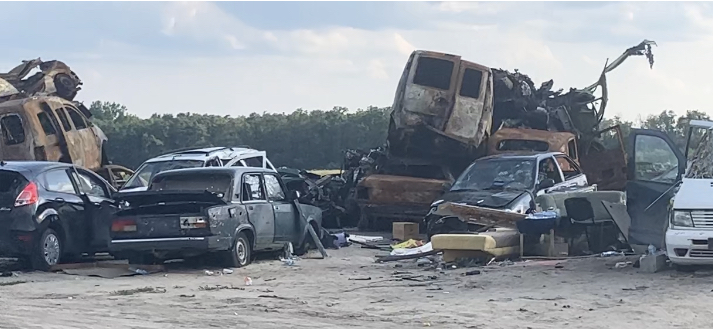
A junkyard with demolished cars, mostly civilian, is another site of the Bucha war crimes: some of the charred cars were found with families burnt alive inside.
Vul. Yablonska: Bucha massacre worst
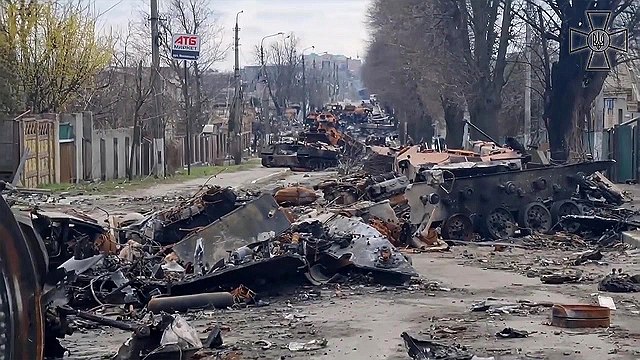
Vul. Yablonska in Bucha is called “the horror street.” Many bodies were lying on both sides of the street and in the yards. Russians were here to capture Kyiv, the capital of Ukraine, and they failed. This location is important: vul. Yablonska is parallel to the Bucha river and the Russians needed to cross it in order to enter the city of Irpin, then cross it all the way to the Irpin river.
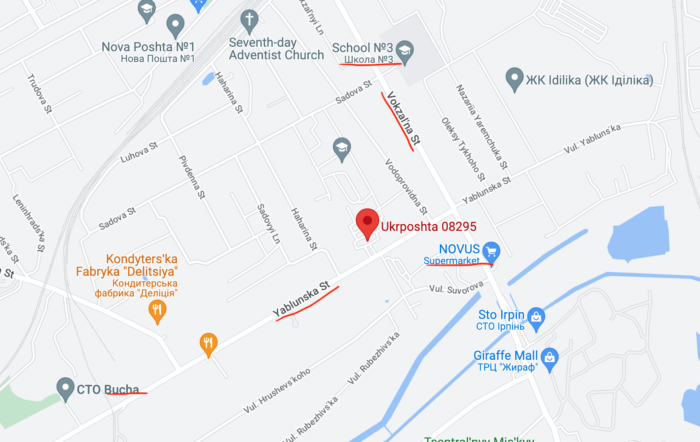
The two rivers prevented the Russians from capturing Kyiv. Here, they broke the fences and parked their tanks in the yards, preventing the Ukrainian army from attacking. Local residents had to live in the basements. In July, they were still fixing bullet holes in the fences, building new fences and walls, watering and trimming their lawns, and planting roses.
Along Vodoprovidna street, local residents pile up debris and construction waste, relying on the municipality for garbage removal. Heavy bicycle traffic is once again safe: during the occupation, the Russians shot bicyclists.
The occupiers used a local school as their headquarters and damaged the building before leaving, smashing windows, roofs, computers, and school equipment. The city is planning to rebuild the school by the start of the school year on the 1st of September and provide offline schooling.
Related: “You’ve always been my helping hand”. Daughter of a Bucha victim helps orphans to cope with trauma
A proper bomb shelter in the basement is being built, for the students and for the residents of the nearby neighborhoods. It is a requirement in Ukraine. 60% of Russian artillery hits were civilian infrastructure objects, with a high number of schools.
The local authorities, in cooperation with the Polish government, built temporary housing for the Bucha residents who lost their homes and for internally displaced persons from other areas of Ukraine. Starlink provides fast Internet and a brand new playground is built in the yard.
On vul. Vokzalna, the local residents and authorities had to clean the area from the destroyed Russian tanks, and clear the rubble—and the corpses. More than twenty bodies were found, three of them with arms tied up, shot from the back—the images of the Bucha massacre that exploded the Internet.

Irpin got destroyed even more than Bucha. The dorms of Irpin University are badly damaged. Before COVID, over 12,000 students studied here. During the occupation, it became a site of major battles and one of the university buildings was turned into a shelter and humanitarian aid center. The central building of the university is destroyed beyond repair.
Continent, a newly-built apartment complex in Irpin, also got damaged and robbed by the Russians. They went from flat to flat and took everything: computers, new furniture, home appliances, and kitchen equipment, and shipped the items to Russia via Belarus.
According to the owners, only 10% of the apartment complex’ residents have returned. In Bucha, over 40% population came back to their apartments and houses. A power station and local gas stations were also destroyed.
Life after the Bucha massacre
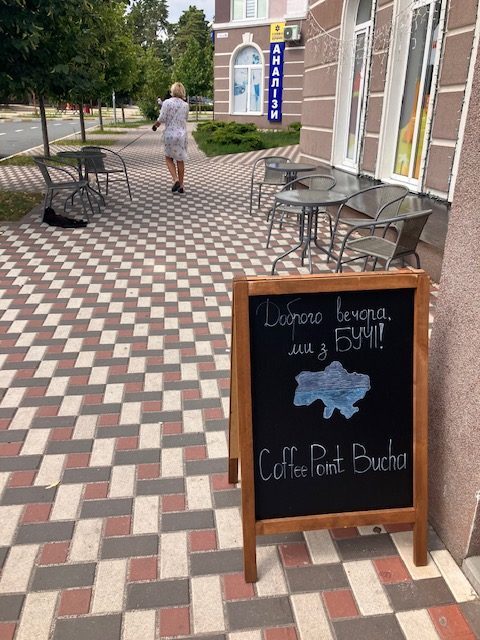
By July 2022, supermarkets, cafes, private kindergartens, and even a LEGO club for kids offer services to the residents. First hit by the COVID pandemic restrictions in 2019—2022, the local entrepreneurs faced re-opening after one of the most gruesome tragedies of the century during the ongoing war.
“It’s the nature of the business to do business. If you are not operating you don’t have money and you don’t have the way to make money. Many private businesses are reopening after the tragedy we had here, after the occupation, after the evacuation. The residents are returning,” said Mykhailyna Skoryk-Shkarivska, Deputy Mayor of Bucha, Deputy of the Irpin City Council, a former journalist and activist in an interview with Euromaidan Press.
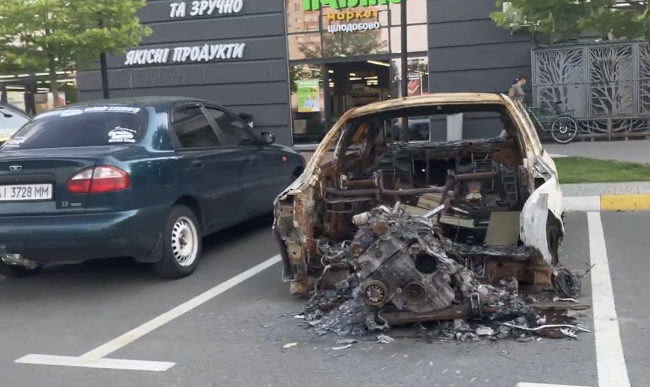
The Deputy Mayor of Bucha knows about finding strength after a tragedy. In 2014, Ms. Skoryk-Shkarivska lost her husband Serhii Shkarivskyi, the captain of the “Donbas” volunteer battalion, to the war. He defended Ilovaisk, in the Donetsk Oblast, and was killed by a sniper’s bullet. Ms. Skoryk-Shkarivska covered the Revolution of Dignity, the annexation of Crimea, and the Euromaidan in 2013-2014 before turning to politics.
In an interview, she talked about the necessary support for Bucha businesses, about reopening, restoring, and rebuilding.
“Our entrepreneurs are doing it all by themselves. Unfortunately, the city of Bucha cannot provide assistance programs at the moment. We don’t have the means to help, to run all the necessary measures. This is one of our dire needs: to help businesses reopen, start new businesses, and help fix the damages.”
The Bucha Agency for Original Development is actively searching for grant money as the city budget is depleted. The Russians destroyed many major taxpayers in the area by tanks. The NOVUS supermarket, McDonalds, Epicenter shopping mall, and other trade centers are not operating at the moment.
“The city budget has suffered as the Russians destroyed the businesses of the major taxpayers in Bucha. Means are limited. Help is needed with building school bomb shelters and repairing the damaged medical facility.
Bucha needs help and longtime support. The city would welcome the international community assistance and support for Bucha businesses, as well as financial help with the restoration of the damaged and destroyed civil infrastructures, residences, and industrial complexes,” ,” said Ms. Skoryk-Shkarivska.
“Bucha does not want to be “the place of tragedy” and is determined to get rid of this label. Our main job right now is to restore as much as possible before winter. Local people are expecting that the local government will fix everything, so it is all just back to what it used to be before the Russian invasion on the 24th of February.”
Ms. Skorik has an idea to build a new multifunctional clinic in Bucha to provide better medical services for the residents.
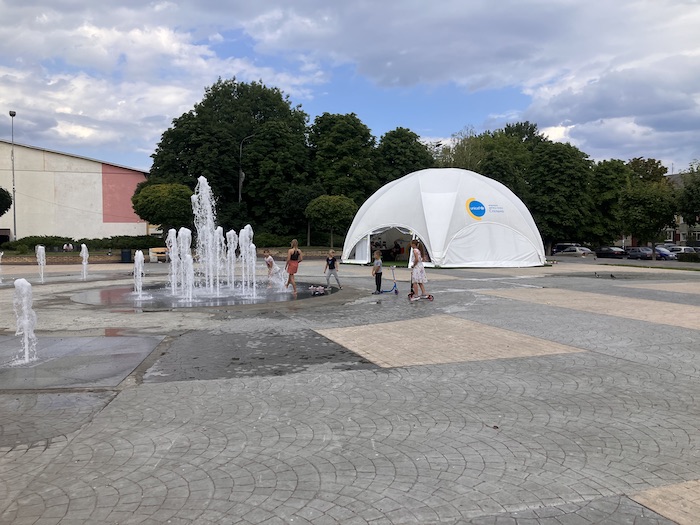
“We are a modern society, with high standards of living, and we want to have our computers, phones, nice restaurants. We need to maintain modern life if we want to be a modern nation in the future. So that’s our duty and our duty as the City Council to maintain the standards of life in Bucha and in Ukraine in order to win this war. And we want to have a great victory followed by a recovery.
We need to liberate all our territories: Crimea, Kherson. We don’t want Mykolaiv and Odesa under fire. We want the whole territory of Ukraine to be safe. And safety means that the whole territory of Ukraine and all borders are under Ukrainian control. Russia can attack anywhere, from Belarus or from Crimea. We need to protect our territory and our life.”
On the way out of town, we pass by several women gardening by their partially restored homes.
Read More:
- Ukraine’s secret to resisting Russia: resilience
- NEST initiative gives Ukrainians rebuilding their houses after Russia’s invasion a temporary mobile home
- Bucha massacre: Ukraine urges ICC to gather evidence of Russian war crimes
- Whoever could, fled the Russians. We went back to Irpin to save the rest
- Bucha: a turning point–not only in Putin’s war in Ukraine, but in relations between Moscow and the world
- “They were shot in the back of the head.” Eyewitness account of Russia’s murders of Bucha residents
- Russian propagandists should be put on “Bucha List” for inciting genocide – Ukrainian MP
- “You’ve always been my helping hand”. Daughter of a Bucha victim helps orphans to cope with trauma




